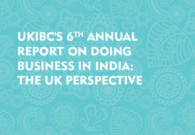University Social Responsibility in India and Beyond
UKIBC Higher Education Sector Manager, Tara Panjwani, speaks at the University Social Responsibility conference in Hyderabad.

Recently, I was asked to speak on the interdependence of University Social Responsibility (USR) and Corporate Social Responsibility (CSR) at an academic conference in Hyderabad titled ‘University Social Responsibility in India and Beyond.’
The conference was a joint initiative between the University of Hyderabad, the University of East Anglia and the UKIBC comprising a series of policy roundtables on the first day and a thought leadership seminar on the second.
Business leaders, academic administrators, and senior Government Officials were invited to participate and what followed were fascinating discussions on the importance of USR, its links with CSR and policy measures that need to be taken to formally incorporate social responsibility more fully into the higher education ecosystem and the broader corporate landscape.
Being far from an expert on this topic, I initially struggled with my hypothesis but the intellectual debates over the course of the two days gave me real food for thought. Here is what I proposed:
It struck me that USR and CSR are intrinsically connected with the common denominator being the people and the community. Despite this connection, more often than not, both USR and CSR tend to operate in silos in a static and disconnected manner. However, in today’s rapidly changing and increasingly interdependent world, no organisation (be it an educational institution or a business) can survive or sustain itself over the long term if it is not socially responsible and if it is not collaborating.
So how can this be fixed? The answer ultimately is… by going back to the drawing board and starting from scratch to sketch out a fresh, new joined-up approach to overall social responsibility.
First and foremost, what is urgently needed is a major shift in mindsets and attitudes. Schools and universities need to go back to their original foundational purpose – to educate, shape minds, inculcate the right values and develop good citizens who then go on to become change makers that positively impact the world around them. Industry for its part, also needs to embed Social Responsibility deep into its organisational culture, its corporate ethos and into its very DNA so that both management and employees approach the concept of Social Responsibility in a much more holistic and integrated manner rather than the transactional and add-on way in which most companies tend to practice it currently. In an ideal world this mindset shift will result in the following sequence of events:
A university will produce a socially responsible good citizen who then joins a company which has fully embraced social responsibility across all the company’s workstreams and activities. Not only does the young graduate enjoy a much more connected and enriching university and career experience but now they are very well equipped and aware of the importance of developing linkages between the two entities to the maximum advantage of both. As more and more such proactive individuals transition from higher education into the corporate world, the ties and communication points between these key stakeholders continue to deepen and strengthen. As the convergence of USR, CSR and ISR (Individual Social Responsibility) gathers momentum, what emerges is a new society shaped by socially responsible educational institutions, individuals and corporates – the natural beneficiary of which is the local community.
As it starts to prosper, the community in turn, provides an added boost to industry, academia and individual wellbeing. Over time, this creates a virtuous, self-reinforcing cycle which allows the entire ecosystem to flourish and become genuinely sustainable over the long term. Working in conjunction also has the added benefit of enabling businesses and educational institutions to learn best practices from each other – companies can learn from universities how to influence minds to produce socially responsible employees who strive to be good citizens while universities can learn practical methods from corporates on how to create, articulate and incorporate bespoke socially responsible frameworks and policies into their administrative systems. This scenario can first be trialled in a local region, then extended to include wider geographies within a country and then later rolled out into the global arena.
Advocating UK-India Higher Education
The UK India Business Council was proud to co-organise the University Social Responsibility Conference in Hyderabad, with the University of Hyderabad, and our member, the University of East Anglia, in March.
UKIBC Higher Education Sector Manager, Tara Panjwani, was a speaker at the Conference talking on what harnessing the full potential of University Social Responsibility could mean for not just academic institutions, but for business and society.
Advocating University Social Responsibility is a core part of UKIBC’s member-led Sector Advocacy Group strategy for 2019 alongside connecting the needs of businesses in India with the skills of UK graduates on a long-term, sustainable basis, and building on our report ‘Beyond the Top 200’ advocating for effective international collaboration in India’s Higher Education system.
If you would like to learn more about UKIBC’s work to support Higher Education in the UK-India corridor, or get involved, email Tara Panjwani at tara.panjwani@ukibc.com

 By Tara Panjwani
By Tara Panjwani 




